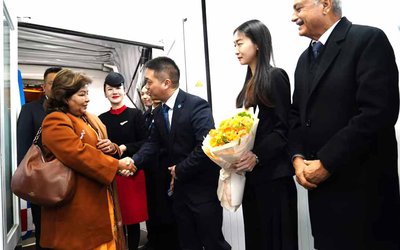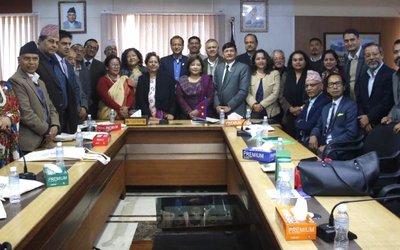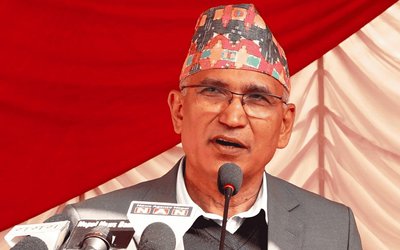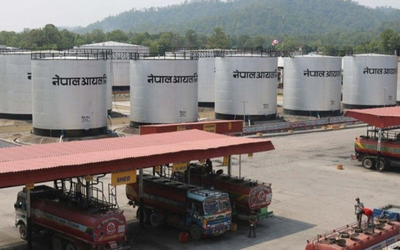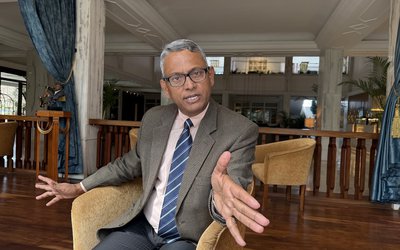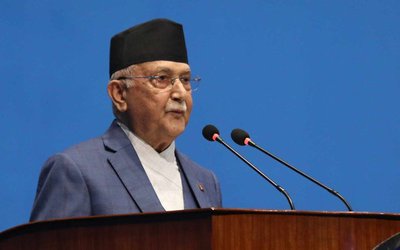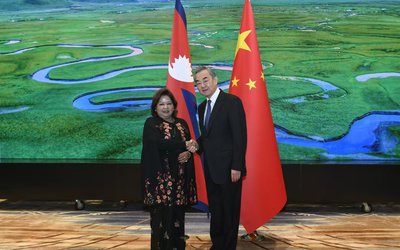
Minister of Foreign Affairs Pradeep Kumar Gyawali said that BIMSTEC connects South Asia with South East Asia-two vibrant growth poles- is a unique regional platform. He said that our region shares history, geographical contiguity, great civilizations and has huge potentials. Bestowed with natural and human resources, we can collectively contribute to realizing a peaceful, prosperous and sustainable Bay of Bengal region.
Minister Gyawali said that Nepal attaches great importance to regional cooperation under BIMSTEC. “It is one of our foreign policy priorities,” said minister addressing the BIMSTEC ministerial meeting.
“This meeting precedes the Fourth BIMSTEC Summit which will commence tomorrow. Therefore, today’s deliberations and decisions will be of vital importance for the success of the Fourth Summit and also for further strengthening of cooperation under the BIMSTEC process,” said Minister Gyawali addressing the ministerial meeting of BIMSTEC. “Moreover, the recent global economic outlook points to a bright sky with emerging Asia having strong growth prospect. BIMSTEC countries individually remain at the forefront of the economic dynamism. Collective regional economic framework certainly enables BIMSTEC to perform better on economic front.”
However, we are still grappling with numerous economic, social and environmental problems. The challenges of poverty, hunger, backwardness, inequality, natural disasters, environmental degradation, terrorism, organized crimes, illicit drugs and human trafficking; to name a few are daunting. This is a sad predicament and ignominy for us.
BIMSTEC has completed two decades of journey. Though we have made some progress, it has not matched the potentials. So, it is a time for retrospection and serious analysis.
He said that this is the time to address this precarious situation in a determined manner. This is the time to do away with business-as-usual approach. “We must pursue our goals with renewed vigor in a focused and time-bound manner. We must display our quick, collective and firm response to our collective problems. What is required is sincere pursuit of concerted efforts with the common understanding that deeper integration results in a win-win outcome for all of us,” Minister Gyawali said.
If we are to achieve regional growth and prosperity, there is a need to deepen rather than broaden and proliferate areas of cooperation under BIMSTEC. Tangible results ensure credibility of our enterprise. Therefore, rationalizing the priority areas and concentrating on core economic areas such as connectivity, trade, tourism, energy, and agriculture is imperative.
Connectivity is the enabler; energy is the locomotive; technology is the accelerator; investment and trade is the driver of regional growth and prosperity for bringing about structural as well as socio-economic transformation in the region. These transformative factors of regional growth and prosperity should top the BIMSTEC agenda from now onwards. They can be the game changer in our march to shared prosperity.
Poverty remains a great challenge in our region. Poverty in one part of the region is a threat to prosperity everywhere in the region. We must eradicate it through the effective and timely implementation of the BIMSTEC Poverty Plan of Action in line with the 2030 Agenda for Sustainable Development. As the lead country, Nepal remains committed towards this end.
Our region is one of the least integrated regions of the world in trade and physical connectivity despite the fact that not very long ago, the Bay of Bengal used to be a centre for global maritime trade, and a hub of commercial and cultural exchange. The Bay of Bengal was a linchpin between various cultures, societies and civilizations.
Therefore, BIMSTEC should focus on re-vitalizing those links from the past, and on enabling the drivers of integration among the Member States. Negotiations on BIMSTEC Free Trade Agreement are yet to be concluded. Early conclusion and operationalizaion of all trade related instruments is critical for enhancing economic engagements in the region.
We must ensure a competitive incentive structure for our private sector to encourage them to trade and invest in the region. We must make the cost of non-trading in BIMSTEC higher. In this context, BIMSTEC economic and business forums should work together to this end.
It is a matter of satisfaction that a master-plan on transport connectivity is being developed to expand and upgrade connectivity in the region. Initiatives for grid interconnections will also be taken forward after signing of its MoU in this Summit in order to enhance region-wide energy cooperation. Energy trade must be placed in the agenda for further cooperation.
The Bay of Bengal region is vulnerable to climate change and natural disasters. We suffer disproportionately from the adverse impact of climate change. Ecological interdependence of our region from high mountains to deep seas calls for strong collaborative partnership amongst us.
Peace and stability is very important for development. Our region is not free form menace of terrorism and other transnational organized crimes. We have to work together to defeat terrorism in all its forms and manifestations and combat other transnational crimes.
We have to move from commitment to implementation phase. We must make BIMSTEC mechanisms functional and result-oriented. Secretariat must be strengthened with adequate resources.
First, growth and prosperity require tangible progress in trade integration, particularly early progress in the reduction of non-tariff barriers; streamlining regulatory frameworks and harmonization of standards. Trade and transit facilitations must be given top priority. TNC negotiations on all trade-related instruments must be concluded at the earliest.
Minister Gyawali said that transport, energy and ICT connectivity must receive our top priority. We must work together closely to promote sustainable transport networks, sustainable energy and power grid interconnections, and information highways.
He also said that we must address shared vulnerabilities and risks posed by natural disasters, food security and climate change. Resilient and innovative BIMSTEC is absolutely critical to sustaining momentum of growth dynamics, taking into account special circumstances and needs of LDCs and LLDCs.
Photo Courtesy: The Himalayan Times
- India Supported Construction Of Four Schools In Nuwakot
- Mar 19, 2021
- Nepal Denies Permission For Third Phase Trial Of Vaccine Against COVID-19
- Aug 31, 2020
- Messi Can Only Cancel Barcelona Contract If €700 Million Release Clause Is Paid, La Liga Confirms
- Aug 31, 2020
- India To Carry Out Study On Kathmandu-Raksaul Railway
- Aug 28, 2020
- COVID-19: 1,351 Personal Of Nepal Police Infected
- Aug 28, 2020

